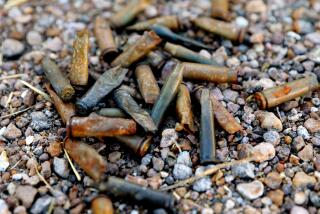War on Drugs in Caribbean Finds an Ally in Old Enemy
- Share via
MIAMI — As he stood before a federal judge here this week, Vivian Blake hardly cut the image of a notorious gang leader--the last of Jamaica’s Shower Posse to be brought to justice for a drug-related crime wave that prosecutors said left more than 1,000 people dead from Los Angeles to Miami in the 1980s.
“I have some solid words for the kids out there,” Blake, wearing a dark blue suit, red tie and reading glasses, said moments before he was sentenced Tuesday. “Crime does not pay.
“Stay away from drugs. Stay away from crime. There’s only one thing that pays, your honor, and that’s a solid education.”
Then, after U.S. District Judge Norman Roettger sentenced Blake to 28 years in prison, prosecutor Lee Stapleton Milford pronounced it “the end of an era for the Shower Posse . . . the last shot to be heard from them.”
But federal drug agents and Jamaican law enforcement officials know that it won’t be the last they hear from Blake.
The 45-year-old former posse leader, who pleaded guilty to racketeering and drug trafficking charges after his extradition from Jamaica last year, has agreed to help attack the Caribbean drug pipelines that now bring in as much as a third of the cocaine sold in the U.S.
His relatively light sentence--prosecutors said he could be eligible for parole in eight years--was in exchange for a wealth of information Blake has provided during debriefing sessions with federal agents here.
In the plea agreement Blake signed earlier this year, he pledged to “fully” disclose “all knowledge which he has . . . relating to the smuggling and trafficking” of drugs and money, and to testify before federal grand juries.
Such insight from so senior a figure in the trade, U.S. and Jamaican officials said, couldn’t come at a more crucial time for Blake’s Caribbean homeland.
Jamaica’s crime wave, driven largely by the drug trade, enduring poverty and illegal gun imports from the United States, is one of the worst in the Caribbean nation’s history.
Although largely confined to the capital, Kingston, the violence already has left more than 600 dead this year on an island of 2.6 million people. There are reports of increased migration from the island. And a leading Jamaican businessman, hotelier Gordon “Butch” Stewart, recently called on his government to resign if it can’t restore public security.
In a nationally televised address in Jamaica on the eve of Blake’s sentencing, Prime Minister P. J. Patterson unveiled yet another war on crime, including a new, specially trained strike force, checkpoints, searches and curfews and closer monitoring of criminal deportees from the U.S.
Many remain unconvinced. After the speech, Anthony Chang, the head of the Jamaica Chamber of Commerce, told the island’s established daily, the Gleaner, “The reality is that people are terrified, edgy and unable to effectively produce. . . . We cannot go on like this.”
Drug enforcement officials in the U.S. and Caribbean agree that the most effective way to attack the drug violence is from within, using insiders such as Blake to penetrate urban gangs that are so well armed, insulated and politically connected that their inner-city Kingston neighborhoods are called “garrisons.”
Blake, whose murder charges were dropped for lack of evidence and who asserts that he never killed anyone, made it clear in court this week that he is only too happy to help.
“I stand here today with a very free conscience,” he told Roettger from the court’s podium. “I have shed burdens of my wrongdoing to the government. . . . I was given a chance to come clean and speak the truth, which I did.”
Blake may well have another personal interest in cleaning up Jamaica’s drug trade: Under U.S. immigration laws, he more than likely will be forced to be returned to Jamaica after serving his minimum sentence.
More to Read
Sign up for Essential California
The most important California stories and recommendations in your inbox every morning.
You may occasionally receive promotional content from the Los Angeles Times.













